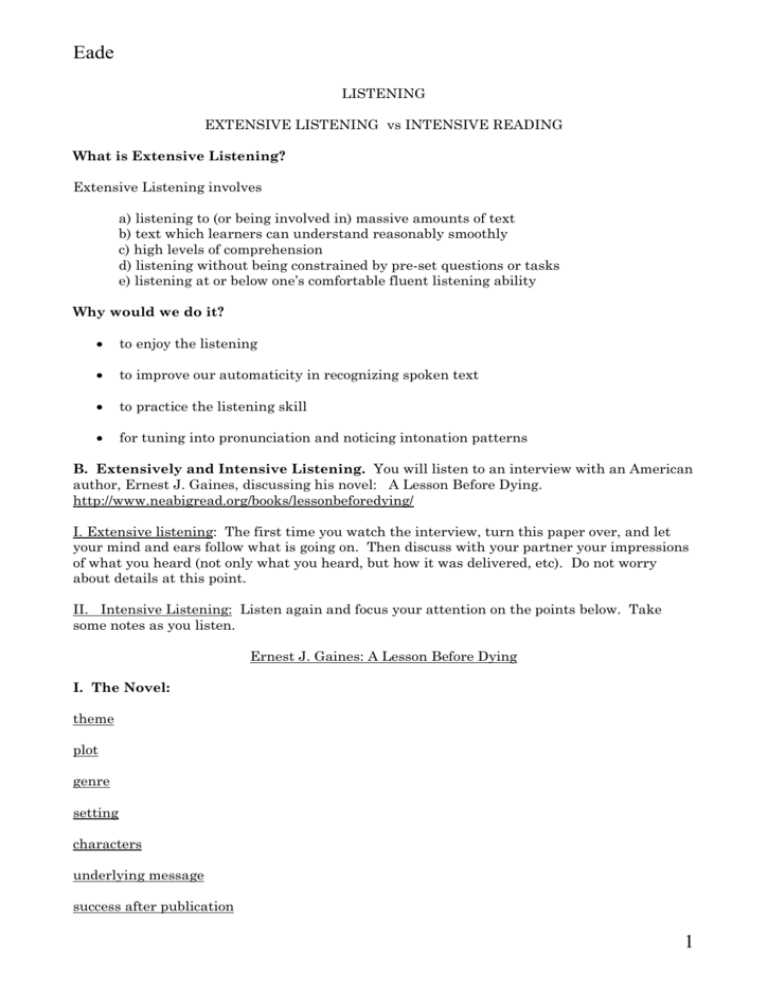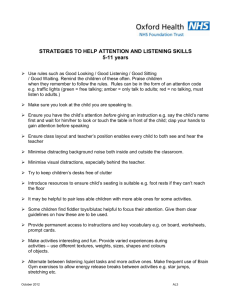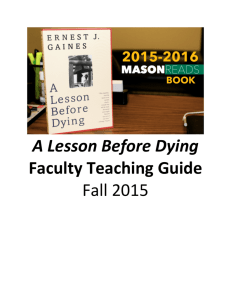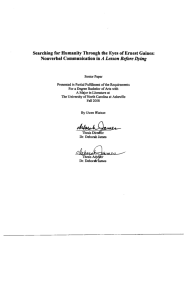Ernest J
advertisement

Eade LISTENING EXTENSIVE LISTENING vs INTENSIVE READING What is Extensive Listening? Extensive Listening involves a) listening to (or being involved in) massive amounts of text b) text which learners can understand reasonably smoothly c) high levels of comprehension d) listening without being constrained by pre-set questions or tasks e) listening at or below one’s comfortable fluent listening ability Why would we do it? to enjoy the listening to improve our automaticity in recognizing spoken text to practice the listening skill for tuning into pronunciation and noticing intonation patterns B. Extensively and Intensive Listening. You will listen to an interview with an American author, Ernest J. Gaines, discussing his novel: A Lesson Before Dying. http://www.neabigread.org/books/lessonbeforedying/ I. Extensive listening: The first time you watch the interview, turn this paper over, and let your mind and ears follow what is going on. Then discuss with your partner your impressions of what you heard (not only what you heard, but how it was delivered, etc). Do not worry about details at this point. II. Intensive Listening: Listen again and focus your attention on the points below. Take some notes as you listen. Ernest J. Gaines: A Lesson Before Dying I. The Novel: theme plot genre setting characters underlying message success after publication 1 Eade II. The Author: childhood interest in books how he started writing authors which have inspired him III. Other III. Practice with Collocation Below is an introduction and summary of the novel you have just heard about. Read it first, then fill in the blanks with appropriate words. Focus on collocation! A Lesson Before Dying Introduction to the Novel Ernest J. Gaines's A Lesson Before Dying (1993) poses one of the most universal ____questions____________ literature can ask: Knowing we're going to die, how should we ________________? It's the story of an uneducated young black man named Jefferson, ________________ of the murder of a white storekeeper, and Grant Wiggins, a ________________-educated native son of Louisiana, who teaches at a plantation ________________. In a little more than 250 pages, these two men named for ________________ discover a friendship that transforms at least two lives. In the first __________, the ________________ man's grief-stricken godmother, Miss Emma, and Grant's aunt, Tante Lou convince an unwilling Grant to spend ________________with Jefferson in his prison ________________, so that he might confront ________________ with his head held ________________. Most of the novel's violence ________________ offstage in the first and last chapters. Vital secondary ________________ punctuate the narrative, including Vivian, Grant's assertive yet patient Creole girlfriend; Reverend Ambrose, a __________ whom the disbelieving Grant ultimately comes to respect; and Paul, a white deputy who stands with Jefferson when Grant cannot. White, ________________, mulatto, Cajun, or Creole; rich, ________________, or hanging on; young, ________________, or running out of time-around all these people, Gaines crafts a ________________ of intimacy and depth. He re-creates the ________________ of Miss Emma's fried chicken, the ________________ of the blues from Jefferson's radio, the ________________ of the sugarcane from the plantation. The school, the parish 2 Eade church, the town bar, and the jailhouse all come ________________ with indelible vividness. In the tradition of Harper Lee's To Kill a Mockingbird (1961) and Truman Capote's In Cold Blood (1966), Gaines uses a capital case to explore the nobility and the barbarism of which human beings are equally ________________. The story builds inexorably to Jefferson's ultimate bid for dignity, both in his prison diary and at the hour of his ________________. That Ernest J. Gaines wrings a hopeful ________________ out of such grim material only testifies to his prodigious ________________ as a storyteller. ASSIGNMENT: you will listen to an interview with an author, take notes and then write a summary of the interview. Step One: Choose one of the sites below and then choose an interview I. http://www.neabigread.org/books.php Choose one of these titles: The Joyluck Club, Bless me Ultima, The Shawl, Farenheit 431, Old School. Then click on Films. II. http://media.barnesandnoble.com/index.jsp?fr_chl=eeef1c48b137ca6f7002930b78484d1eab3a0a 7d Choose one of the following interviews. 1) Jonathan Franzen: 2) Yann Martel 3) Anna Quindlan 4) Michael Moore 5) Dan Brown III: http://aalbc.com/authors/paulo_coelho.htm#SECC_ Listen to Parts One and Two of the interview with Paolo Coelho IV. http://aalbc.com/authors/chimamanda_ngozi_adichie.htm Listen to the talk by Chimamanda Ngozi Adichie V. http://aalbc.com/authors/toni.htm Scroll down to the second video entitled: Toni Morrison discusses “A Mercy” Step Two: Note-taking. Watch the film several times, the first time use your extensive listening skills. Then, take notes the second and third time as you go. Make yourself headings similar to the ones we used in class for the interview with Ernest J. Gaines. Step Three: Summary Writing: Use your notes to write a summary of the interview. Your summary should be divided into two paragraphs: Paragraph I: about the author Paragraph II: about the novel You should your notes and your summary at the next lesson. 3







